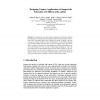Free Online Productivity Tools
i2Speak
i2Symbol
i2OCR
iTex2Img
iWeb2Print
iWeb2Shot
i2Type
iPdf2Split
iPdf2Merge
i2Bopomofo
i2Arabic
i2Style
i2Image
i2PDF
iLatex2Rtf
Sci2ools
HUC
2004
Springer
2004
Springer
Designing Capture Applications to Support the Education of Children with Autism
We explore the social and technical design issues involved in tracking the effectiveness of educational and therapeutic interventions for children with autism (CWA). Automated capture can be applied in a variety of settings to provide a means of keeping valuable records of interventions. We present the findings from qualitative studies and the designs of capture prototypes. These experiences lead to conclusions about specific considerations for building technologies to assist in the treatment of CWA, as well as other fragile demographics. Our work also reflects back on the automated capture problem itself, informing us as computer scientists how that class of applications must be reconsidered when the analysis of data in the access phase continually influences the capture needs and when social and practical constraints conflict with data collection needs.
Related Content
| Added | 01 Jul 2010 |
| Updated | 01 Jul 2010 |
| Type | Conference |
| Year | 2004 |
| Where | HUC |
| Authors | Gillian R. Hayes, Julie A. Kientz, Khai N. Truong, David R. White, Gregory D. Abowd, Trevor Pering |
Comments (0)

